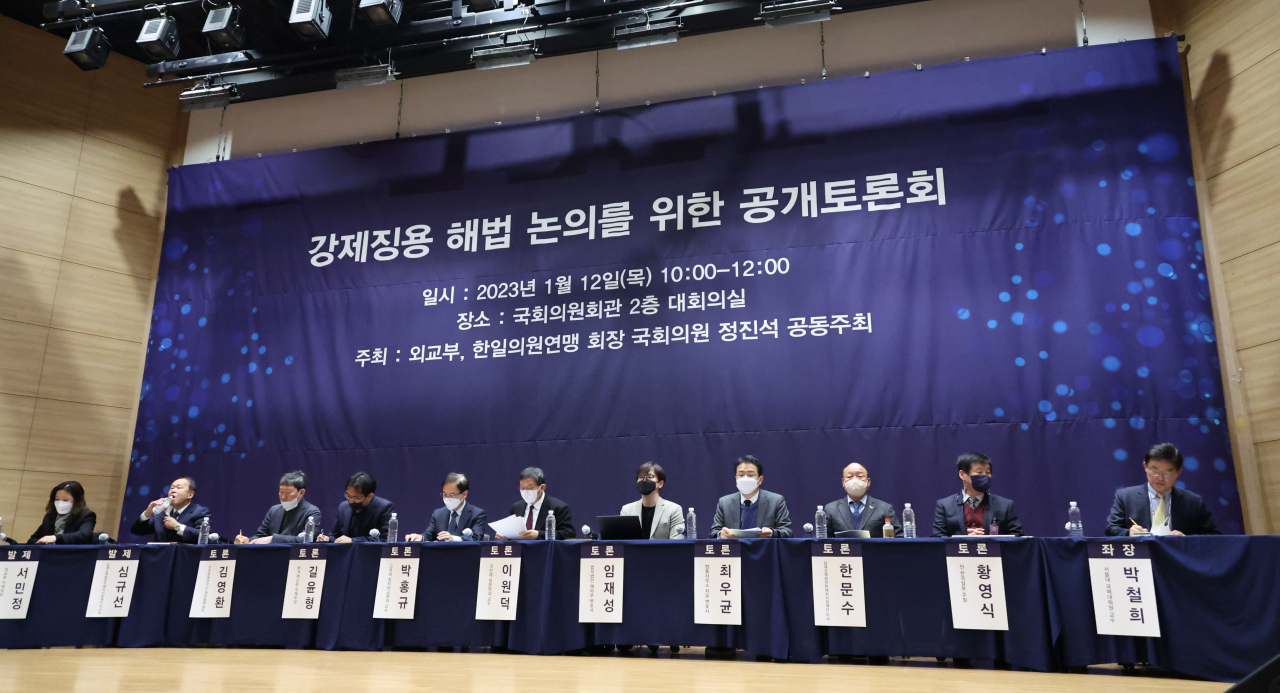
Deepening discord was revealed Thursday over how to bring Japan to make amends to Koreans forced into labor by Japanese firms during World War II, further weakening the Yoon Suk Yeol administration’s drive to seek a thaw in frayed Seoul-Tokyo ties.
Thursday’s public debate, held at the National Assembly to gather public input that could help settle the dispute, reaffirmed concerns that Japan’s apology and compensation -- two conditions victims demand but that have been denied by an unwilling Tokyo -- are not likely to be part of a compromise. Japan retaliated with export curbs following Korea’s top court ruling in 2018 that held Japanese firms liable for damages.
Seoul’s Foreign Ministry, at the hearing it hosted, essentially acknowledged having the Korean government or companies compensate the victims while expecting Japan’s “sincere response” is the practical course of action for now -- an option victims had repeatedly refused to accept. The same victims were left more visibly frustrated than ever after the debate, and the ministry rushed to avoid a wider public backlash.
“We will more swiftly and responsibly work on a settlement, with public input we’ve heard up until now. I really hope people see that,” a senior Foreign Ministry official said. The ministry, however, did not elaborate as to whether any more public hearings will take place as victims strongly demanded during the heated debate, citing the lack of time to make their case before the panel of experts and ordinary representatives of the public.
Lim Jae-sung -- the attorney that delivered a win to Korean victims in the 2018 ruling by the Supreme Court in Seoul -- described the entire procedure as “pro forma,” saying the Foreign Ministry hardly presented anything close to agreeable terms. “It’s clearly rushing into a decision it knows victims won’t swallow. I genuinely wonder why,” he said.
Meanwhile, the Japanese government has maintained the 1965 treaty, which normalized its diplomatic relations with South Korea following Japan’s 1910-45 colonial rule of the Korean Peninsula, already resolved the issue.
“We’re in continuous diplomatic consultation with each other,” Japan’s new Chief Cabinet Secretary Hirokazu Matsuno said at a press briefing later in the day, a clear indication that Tokyo will not reverse its position on the contentious issue.
It is unclear whether President Yoon will be able to inject fresh momentum to find a breakthrough in the dispute as he attends the Davos forum in Switzerland next week, where the Korean leader could meet with his Japanese counterpart, Prime Minister Fumio Kishida, on the sidelines.
A senior official from Yoon’s office declined to elaborate on a potential meeting, saying the office is not aware of whether Kishida would take part in the gathering on the global economy in the first place. “And the meeting by nature doesn’t really lead to sideline summits as far as I know,” the official added.
The latest stalemate over a long-running historical dispute comes as Yoon eagerly looks to reset ties with Tokyo, Seoul’s economic as well as military partner with whom South Korea seeks to rein in North Korea, its biggest security threat. Japan is part of the three-way military coalition that includes South Korea and the US in pursuit of a less belligerent North Korea amid the isolated country’s nuclear buildup.
Washington has distanced itself from becoming overly invested in the dispute, out of fear that unwarranted intervention could render reconciliation much harder.





